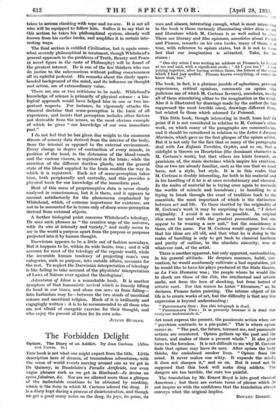The Forbidden Delight
Opium. The Diary of an Addict. By Jean Cocteau. (Allen and Unwin. Ss.) This book is not what one might expect from the title. Little description here of dreams, of tremendous adventures,-with the sense of world events moving around one as we get in De Quincey, in Baudelaire's Paradis Artificiels, nor even vague phrases such as we get in Rimbaud—Je devins un opera fabuleux, &c. Nor are we allowed more than a glimpse of the ineluctable emotions to be obtained by smoking, which is the form in which M. Cocteau adored the drug. It is a diary kept during a process of disintoxication, and though we get a good many notes on the drug, its joys, its pains, its uses- and abuses, interesting, enough, what is most interesting in the book is those curiously illuminating obiter dicta on art and literature which M. Cocteau is so well suited to give.
There are literary and film opinions, anecdotes about Proust and Picasso, remarks on his own books, many of them, it is
true, with reference to opium states, but it is not to these last that our imagination is attracted. Take, for in. stance :
" One day when I was writing an address at Picasso s, he looked at me and said, with a significant smile • ' Ah I you too ' I was joining together, after having written them, the letters of the name which I had just spelled. Picasso knows everything, of course he knew that, too."
The book, in fact, is a glorious jumble, of aphorisms, personal experiences, critical opinions, comments on opium (the judicious use of which M. Cocteau favours), anecdotes, nearly all of them stimulating either to the imagination or the mind. Also it is illustrated by drawings made by the author (he has suppressed the most terrible ones), drawings different from, but related to those which adorned Le Potomak.
This little book, though interesting in itself, loses half its point if it is not considered in relation to M. Cocteau's other work, on which many of the paragraphs are commentaries,
and it should be considered in relation to the Lettre cl Jacques Maritain, which gave us the first glimpse of the opium addict.
But it is not only for the fact that so many of the paragraphs deal with Les Enfants Terribles, Orphie, and so on, that a sidelight is thrown on Heurtebise (the dominant character in M. Cocteau's work), but that others are hints towards, or precisions of, the main doctrines which inspire his creations. One or two are already familiar, such as the one that we must have, not a style, but style. It is in this realm that M. Cocteau is doubly interesting, for both in his material and in his handling of it he is at once revolutionary and classical.
In the realm of material he is trying once again to reconcile the worlds of miracle and humdrum ; in handling he is trying to break through the crust of tradition back to the essentials, the most important of which is the distinction between art and life. To those startled by the originality of M. Cocteau's work it may be surprising to read, "I detest originality. I avoid it as much as possible. An original idea must be used with the greatest precautions, lest one appear to be wearing a new suit," but the consistency is there, all the same. For M. Cocteau would appear to claim that his ideas are all old, and that what he is doing in the realm of handling is only to get back to classical hardness and purity of outline, to the absolute sincerity, won at whatever cost, of thg artist.
There is another apparent, but only apparent, contradiction, in his general attitude. He despises manners, habit, con- vention, he would assiduously cultivate a bad reputation, yet he would like to have his plays produced at the State theatre,
as La Vois Humaine was ; the people whom he would like to shock are those of the elite, the intellectual and artistic
snobs, not from the love of shocking, but from hatred of artistic cant. For this reason he hates " literature," as, he declares, Picasso hates painting. The intense object of his life is to create works of art, but the difficulty is that any live expression is beyond understanding : "Pnoisooreapri Orin : But this telegraph is dead.
" PHONOGRAPH Twos It is precisely because it is dead that everyone understands it."
Art must express the present, the passionate action when our " psychism contracts to a pin-point." This is where opium comes in. " The past, the future, torment me, and passionate actions are countered. Opium gathers up the past and the future, and makes of them a present whole." It also gives form to the formless. It is not difficult to see why M. Cocteau feels that opium may have its uses. After opium the body thinks, the embalmed smoker lives. " Opium frees the mind. It never makes one witty. It expands the mind ; it does not sharpen it," and so on. But it must not be supposed that this book will make drug addicts. The dangers are too terrible, the cure too painful.
The translation by Mr. Ernest Boyd is into good classical American ; but there are certain turns of phrase which do not inspire us with the confidence that the translation always
conveys what the original implies. Bowasiv Doss-is.






































 Previous page
Previous page